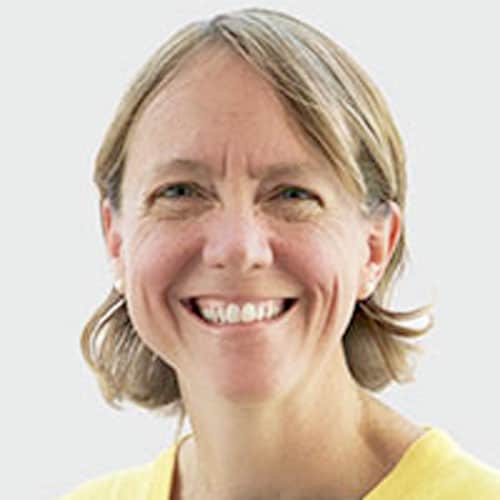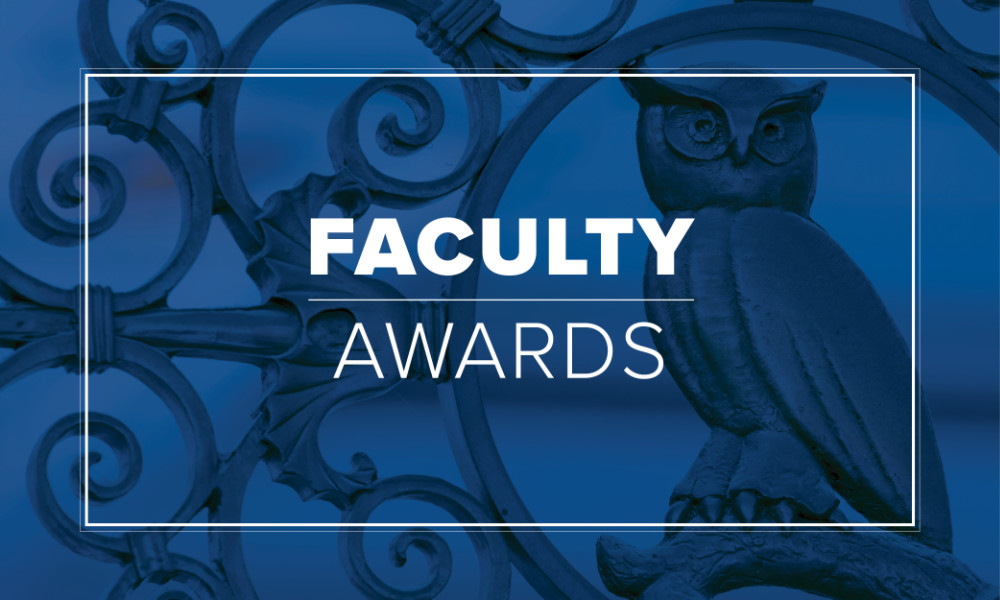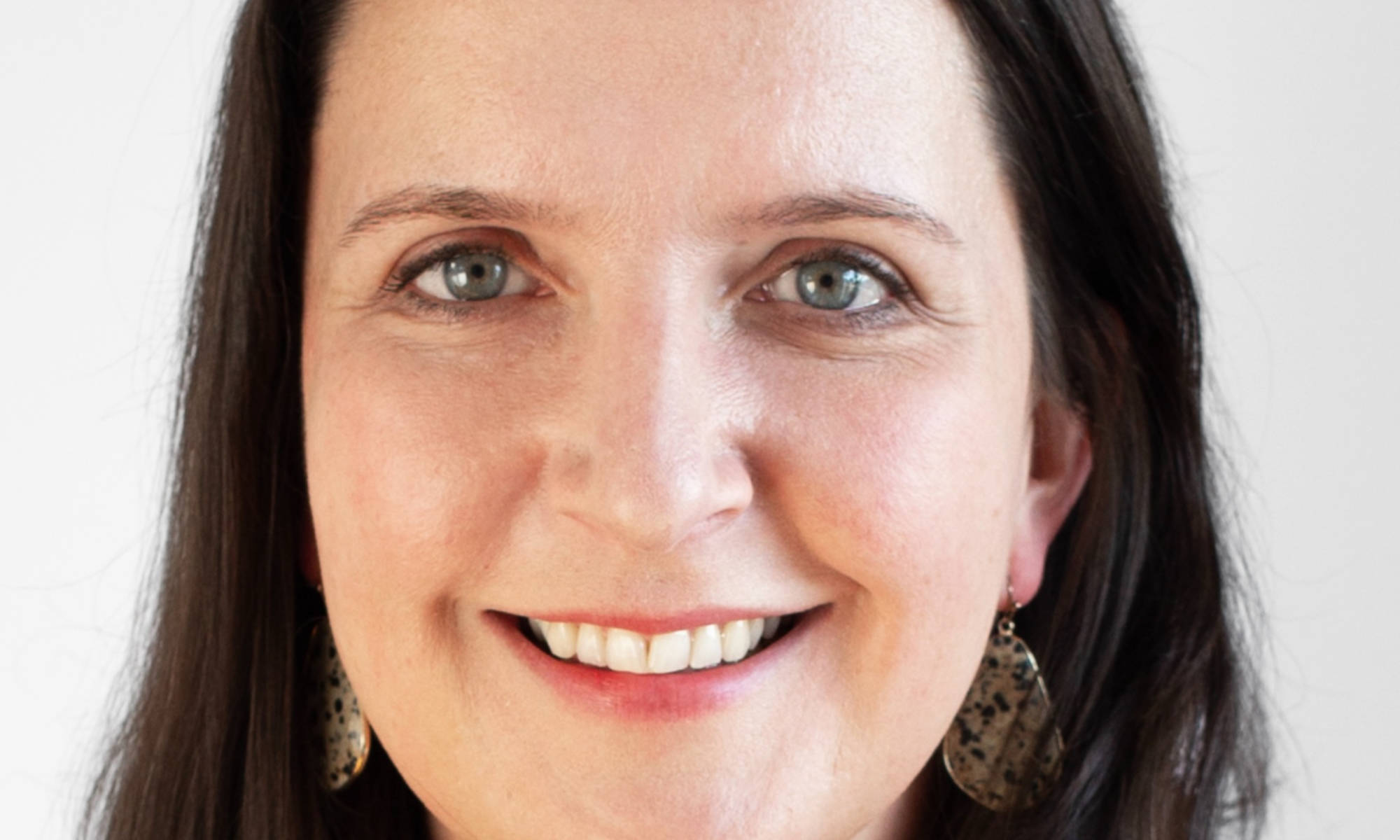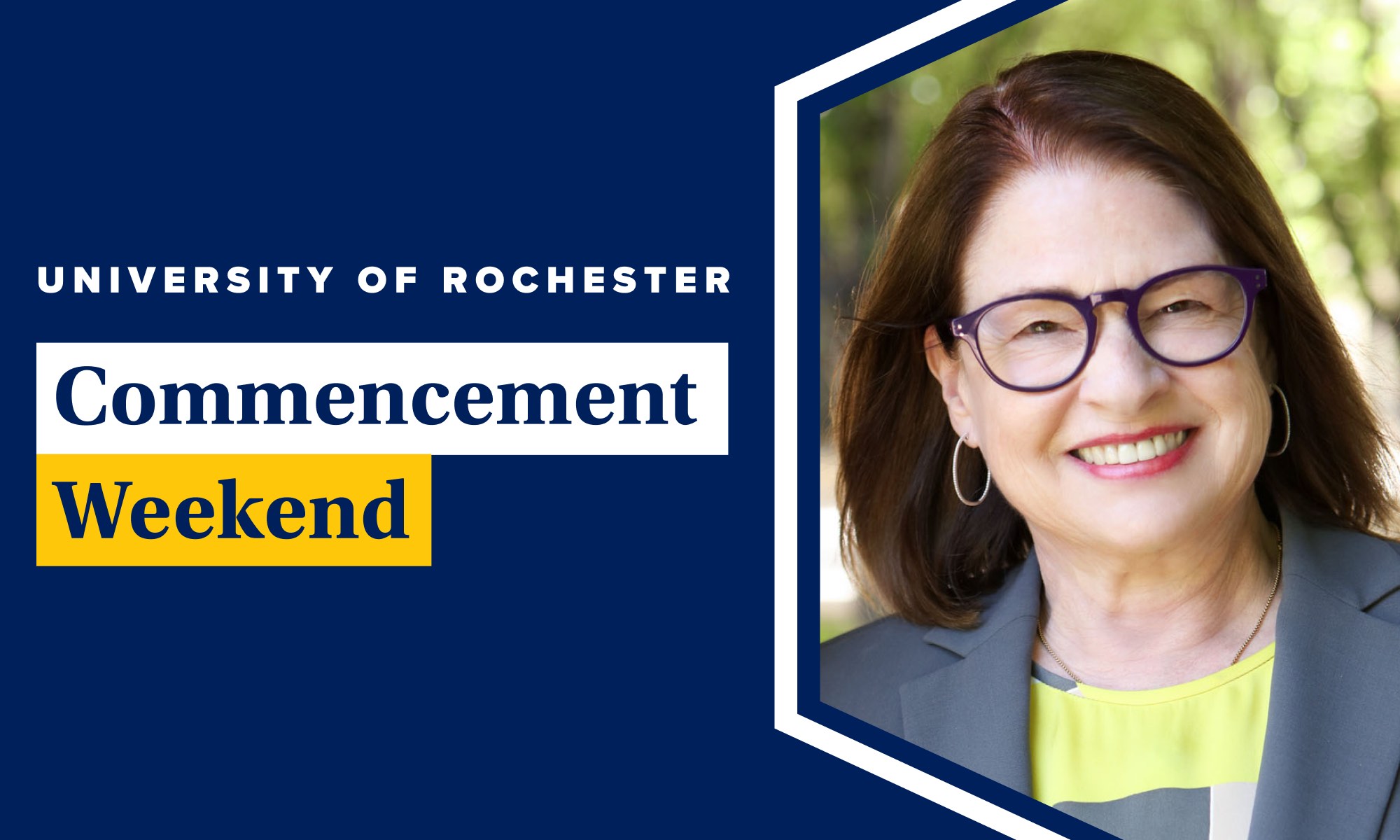The University of Rochester will recognize the outstanding contributions of distinguished leaders and scholars by bestowing honorary degrees, the Eastman Medal, Hutchison Medals for exemplary service, and awards for scholarship and teaching. These awards will be presented at the 165th Commencement ceremonies on May 15, 16, and 17. The Simon Business School ceremony will be held June 7.
2015 University Honorary Degrees
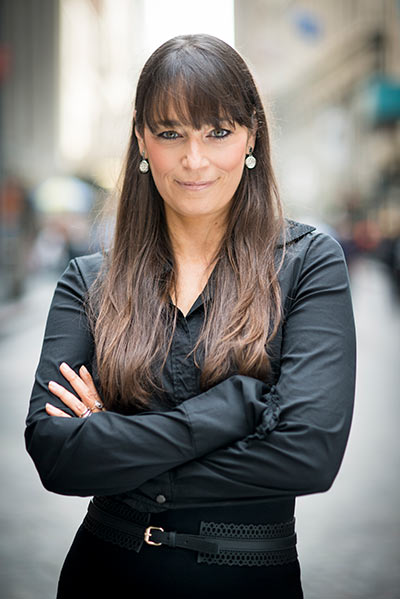 Deborah Bial, founder and president of the Posse Foundation, will receive an honorary doctor of humane letters degree and deliver the College’s commencement address on May 17.
Deborah Bial, founder and president of the Posse Foundation, will receive an honorary doctor of humane letters degree and deliver the College’s commencement address on May 17.
Bial is nationally recognized for facilitating dialogue related to diversity and guiding selective higher education institutions toward improved admissions policies.
The Posse Foundation is a youth leadership development and college access organization that sends teams (“Posses”) of students from diverse backgrounds to selective colleges and universities. Since 1989, the Posse Foundation has named more than 6,000 Posse Scholars. These young people have won $800 million in leadership scholarships from Posse’s partner colleges and universities. They are persisting and graduating at rates of over 90 percent and are active leaders both on their campuses and in the workforce.
Today, the Posse Foundation supports programs in major cities across the U.S. and has partnerships with 52 top colleges and universities, including the University of Rochester.
Bial earned her master’s and doctoral degrees in education with a focus on higher education administration, planning, and social policy from Harvard University. She completed her undergraduate degree at Brandeis University.
She is the recipient of numerous awards, including the Harold W. McGraw Jr. Prize in Education and the Anne Roe Award from the Harvard Graduate School of Education. She is also the recipient of a $1.9 million grant from the Andrew W. Mellon Foundation, and the prestigious MacArthur Fellowship from The John D. and Catherine T. MacArthur Foundation.
Porter W. Anderson, professor emeritus of pediatrics at the University of Rochester School of Medicine and Dentistry, will receive an honorary doctor of science degree. Anderson is known worldwide for his role in developing a vaccine that has nearly eradicated Haemophilus influenzae type b (Hib) infections, a leading cause of bacterial meningitis and epiglottitis. His techniques were later used to develop a vaccine to prevent pneumococcal infections in infancy.
Anderson earned a bachelor’s degree in chemistry in 1958 from Emory University, where he won a Woodrow Wilson Fellowship for post-graduate study. Before graduate study, he worked as an agricultural chemist in Honduras. He began graduate work at Harvard University in 1961, earning his master’s and PhD degrees in bacteriology.
He taught at Stillman College before returning to Harvard to research Hib with pediatrician David H. Smith. The bacterium mainly affects children because they lack natural antibodies to fight it. At the time, 20,000 U.S. children annually were affected by Hib; 5 percent died and up to 45 percent were left with problems such as deafness and brain damage.
The first version of the vaccine proved effective in young children but not infants. Anderson, Smith, and Dr. Richard Insel moved to the University of Rochester where they created a protein-conjugate version of the vaccine with Rochester colleague Dr. Ronald Eby. This worked in infants and became part of routine vaccinations in the U.S. in 1990.
Anderson and Rochester colleagues later developed a protein-conjugate vaccine against the bacteria pneumococcus, which causes pneumonia and pediatric meningitis. It was introduced in developed countries in 2000.
Anderson is the co-recipient of the Albert Lasker Clinical Medical Research Award, and Children’s Vaccine Initiative Pasteur Award for Recent Contributions to Vaccine Development. He is a member of the National Academy of Sciences and a fellow of the American Academy of Microbiology. He has been awarded six patents.
Robert J. Duffy, president and chief executive officer of the Rochester Business Alliance (RBA), will receive an honorary doctor of laws degree.
Before heading RBA, Duffy served as New York lieutenant governor in Governor Andrew Cuomo’s administration from January 2011 to December 2014. He previously served as Rochester mayor from January 2006 to January 2011, and as Rochester police chief from March 1998 to April 2005. He joined the Rochester Police Department in November 1976.
During his tenure as Rochester mayor, Duffy was recognized for navigating difficult economic crises by reducing the cost of government, improving services, lowering tax rates, and attracting millions of dollars in private-sector investments.
As lieutenant governor, Duffy chaired the Regional Economic Development Councils aimed at rebuilding New York’s economy and positioning the state as a global economic leader. Duffy also served as chair of the Spending and Government Efficiency Commission, overseeing an effort to make New York’s government more modern, accountable, and efficient.
In May 2012, the National Ethnic Coalition of Organizations awarded Duffy the Ellis Island Medal of Honor, which honors notable American citizens who demonstrate a life committed to community service.
Duffy holds two degrees from Monroe Community College, a bachelor’s degree from Rochester Institute of Technology, and a master’s degree from Syracuse University’s Maxwell School of Citizenship and Public Affairs.
Richard Rashid ’77 (MA), ’80 (PhD), chief technology officer of Microsoft’s Applications and Services Division, will receive an honorary doctor of science degree.
Having founded Microsoft Research in 1991, Rashid oversaw its worldwide operations until 2013. Under his leadership, Microsoft Research grew to encompass more than 850 researchers who conduct basic and applied research in security, social computing, and human-computer interaction.
Throughout his career, his research has focused on artificial intelligence, operating systems, networking, and multiprocessors. Rashid has participated in the design and implementation of the University’s Rochester Intelligent Gateway operating system, the Rochester Virtual Terminal Management System, Carnegie Mellon University’s Distributed Sensor Network testbed, and its SPICE distributed personal computing environment. In the 1970s, he co-developed one of the earliest networked computer games, Alto Trek.
Rashid has been honored with Microsoft’s Technical Recognition Award, the Institute of Electrical and Electronics Engineers Emanuel R. Piore Award, and the Special Interest Group on Operating Systems Hall of Fame Award. He is a member of the Royal Academy of Engineering, the American Academy of Arts and Sciences, and the National Academy of Engineering.
Before joining Microsoft, Rashid was professor of computer science at Carnegie Mellon University. He received his master’s and PhD degrees in computer science from the University of Rochester in 1977 and 1980, and he graduated with honors from Stanford University in 1974.
The Eastman Medal recognizes outstanding achievement and dedicated service in honor of the University’s great benefactor and the founder of Eastman Kodak Company.
E. Philip Saunders is an entrepreneur known for his business acumen and philanthropic spirit. He was instrumental in reshaping the travel center industry and has had business interests in fields as diverse as auto rental, recreation and tourism, packaged foods, property management, and banking.
Saunders has founded many companies, including Genesee Regional Bank, Griffith Energy, Truck Stops of America, Travel Centers of America, and Sugar Creek Corporation. An owner of Essex Property Management, he also has significant ownership interests in Valley Fuels, Bristol Harbour Resort, Sugar Creek Farms, Western New York Energy, and American Rock Salt.
In 2011, Saunders donated $10 million to the University of Rochester Medical Center to support neuromuscular disease and translational research. The Saunders Research Building, home to the Clinical and Translational Science Institute, clinical research programs, and academic departments, was named in his honor. He serves as a vice chair for the Medical Center’s Meliora Challenge campaign and honorary chair of the George Eastman Circle Rochester Leadership Council.
A Rochester Business Hall of Fame inductee, Saunders serves as board chair of Genesee Regional Bank, Valley Fuels, and Paul Smith’s College. His history of board service includes current positions on the boards of American Rock Salt, Buckingham Properties, Young Entrepreneurs Academy, and Rochester Institute of Technology, where the business school is named in his honor.
The Charles Force Hutchison and Marjorie Smith Hutchison Medal recognizes alumni for outstanding achievement and notable service.
Harvey Alter ’56, ’60M (MD) is a distinguished National Institutes of Health investigator and chief of clinical studies and associate director for research in its Department of Transfusion Medicine.
He is best known for co-discovering the Australia antigen—a key to detecting the hepatitis B virus—and for critical contributions to the discovery and isolation of the hepatitis C virus. These achievements sparked significant public health and research advances in curbing new infections and developing life-saving treatment options.
Through a project that uncovered the causes and reduced the risk of transfusion-associated hepatitis, Alter’s discoveries helped provide the scientific foundation for establishing blood-donor screening programs that have reduced the incidence of hepatitis transmitted through blood transfusions to near zero.
Alter earned both his bachelor’s degree and his medical degree from the University of Rochester. He joined NIH as a clinical associate following his internship and first-year residency at Strong Memorial Hospital. Alter completed a residency in medicine at the University of Washington Hospital System in Seattle, and a fellowship in hematology at Georgetown University Hospital, followed by appointments at Georgetown, which included director of hematology research and assistant professor at the medical school.
In 2013, he received both the School of Medicine and Dentistry Distinguished Alumnus Award and the distinguished Canada Gairdner International Award. Alter’s contributions in hepatitis discoveries were also acknowledged with a 2000 Albert Lasker Clinical Medical Research Award.
A Distinguished Service Medal recipient, Alter has been elected to the National Academy of Sciences, the Institute of Medicine, and Mastership in the American College of Physicians.
Hutchison Medal recipient Joseph F. Cunningham ’67 (MA), principal attorney at Joseph F. Cunningham & Associates in Arlington, Virginia, has practiced law for more than 40 years. He has focused his practice on civil trials and appeals, particularly those related to insurance issues, and litigated thousands of cases in Virginia, Maryland, and the District of Columbia.
After serving as a United States Army first lieutenant stationed in Germany, Cunningham worked as an attorney with a Washington, D.C. government agency, legislative counsel with the United States Chamber of Commerce, and legislative counsel and labor attorney for the E.I. DuPont de Nemours Company. He then served as vice president for government affairs of the National Alliance for Businessmen. Cunningham began his private practice in 1970 in Washington, D.C.
He has written about various legal topics in numerous publications and law journals, and has co-authored three editions of the Virginia State Bar Monograph on Insurance Law. He has also taught or lectured at the Georgetown University Law Center, the University of Maryland, the University of Virginia, and Purdue University.
Cunningham earned a bachelor’s degree (cum laude) from John Carroll University in 1957, a master’s degree from the University of Rochester in 1967, and a JD from the Columbia University School of Law in 1960.
In 2011, he established the Joseph F. Cunningham Professorship of History at the University of Rochester. In 2004, the trustees of Columbia University created the Joseph F. Cunningham Chair of Insurance and Commercial Law in his honor.
Cunningham is a member of the bar of the Supreme Court of the United States; the Fourth, Ninth, and D.C. Circuit Court of Appeals; and the United States District Courts for the Eastern and Western Districts of Virginia, the District of Maryland, and the District of Columbia. He is also admitted to the highest courts of Virginia, Maryland, and the District of Columbia.
The Rochester Distinguished Scholar Award recognizes alumni whose careers in academia, industry, government or the arts have exemplified the values and attributes of the University.
Stephen D. Fantone ’79 (PhD) is president of Optikos Corporation, a Massachusetts-based optical engineering firm he founded in 1982. Optikos provides metrology products, engineering design, and manufacturing services for product development.
In 1974, Fantone received bachelor’s degrees in electrical engineering and management from MIT. In 1979, he earned his PhD in optics from the University of Rochester. In 1978, while completing his PhD, he joined Polaroid Corporation and played a key role in product and technology development there for more than two decades.
Fantone has served on many program review panels, provided expert testimony on patent infringement and trade secret litigation cases, and been awarded more than 65 patents. He is a senior lecturer in the mechanical engineering department at MIT; chairman of the Pioneer Institute for Public Policy Research; and a board member of Rofin-Sinar Technologies, Inc., the Hertz Foundation, and The Optical Society (OSA) Foundation.
Actively engaged with OSA for more than 40 years, he was awarded its Distinguished Service Award in 2007. In 2013, OSA honored Fantone by renaming that award the Stephen D. Fantone Distinguished Service Award.
At the University, Fantone has led many projects in support of optics and engineering. He is the chair of the Boston/New England Regional Campaign and is a member of the Boston Regional Cabinet and the Dean’s Advisory Committee for the Hajim School of Engineering and Applied Sciences.
University Teaching Awards for Excellence
William J. FitzPatrick, the Gideon Webster Burbank Professor of Intellectual and Moral Philosophy, is the 2015 recipient of the Edward Peck Curtis Award for Excellence in Undergraduate Teaching.
He is highly regarded as an extraordinary teacher and scholar who not only instructs his students, but inspires them. FitzPatrick is known as a model and mentor to teaching assistants, a tireless participant in College-level oversight and innovation in undergraduate programs, and a contributor to student life on and beyond the University.
Since 2011, FitzPatrick has been the Department of Philosophy’s undergraduate advisor and has served on various committees dedicated to undergraduate academics. In addition to his undergraduate and graduate teaching and PhD advising, FitzPatrick regularly helps students with their Take Five applications, gives guest lectures in other classes, and presents at various student group events.
FitzPatrick’s research is in moral philosophy, ranging from theoretical issues in the foundations of ethics to questions at the intersection of ethics and the sciences, as well as topics in bioethics and environmental ethics. He received his PhD from UCLA in 1995.
Nickolas (Nick) Vamivakas, assistant professor of quantum optics and quantum physics, is receiving the G. Graydon ’58 and Jane W. Curtis Award for Nontenured Faculty Teaching Excellence.
Colleagues at the Institute of Optics call Vamivakas an innovator and a rising star. Having joined the University in 2011, he has already earned high marks for his teaching abilities, scientific contributions, and scholarly activities.
Vamivakas is an accomplished researcher and gifted teacher, known for his high energy, passion, and ability to explain complex concepts in simpler terms. Students say that he is approachable and that he knows them well. He frequently polls his classes for feedback and makes course adjustments as needed.
Vamivakas is also active in outreach activities, with the aim of encouraging high school students from underrepresented groups to consider careers in science and engineering. For example, he has run the weeklong Optics Photon Camp, a summer high school program aimed at getting students interested in optics.
He received his PhD in electrical and computer engineering from Boston University in 2007. While a graduate student there, he developed high-resolution microscopy and spectroscopy techniques to study the electro-optic properties of individual nanostructures.
Ralph P. Locke, professor of musicology at the Eastman School of Music, is receiving the Lifetime Achievement Award in Graduate Education.
Locke has focused his teaching and research on the social and cultural contexts in which Western music is composed, performed, and debated. This has led him to relate music to such crucial aspects of human life as aesthetics, literature, politics, and religion.
He is a recognized authority on music in 19th-century France and Italy, and on the structures of musical life in the United States since 1860. His four books include Music, Musicians, and the Saint-Simonians, the essay-collection Cultivating Music in America: Women Patrons and Activists since 1860 (co-editor Cyrilla Barr), and Musical Exoticism: Images and Reflections. His most recent is Music and the Exotic from the Renaissance to Mozart.
Locke received his bachelor’s degree in music (cum laude) from Harvard University and his master’s degree and PhD in the history and theory of music from the University of Chicago.
Randall W. Stone, professor of political science, is recognized with the William H. Riker University Award for Excellence in Graduate Teaching.
Since joining the Department of Political Science nearly 20 years ago, Stone has become one of the most distinguished and high-profile scholars in international relations. He has taught and mentored a generation of international relations PhDs—20 have received their PhDs, three more plan to defend their dissertations this year, and all but two occupy academic positions. Stone’s reputation as an outstanding international relations teacher is longstanding, and he has been instrumental in ensuring that the Department of Political Science remains one of the best in the country.
Stone serves as the director of the University’s Skalny Center for Polish and Central European Studies and of the Watson Center for Conflict and Cooperation. He is a member of the editorial boards of International Organization and Review of International Organizations. He is a consultant to the International Monetary Fund and a member of the Council on Foreign Relations and the Valdai Discussion Group on U.S.-Russian Relations. He was the last recipient of the Soviet Peace Fund Fellowship from the USSR Academy of Sciences in 1991.
He earned his PhD at Harvard University in 1993.
Additional information about University commencement ceremonies and related activities is available at www.rochester.edu/commencement/.

